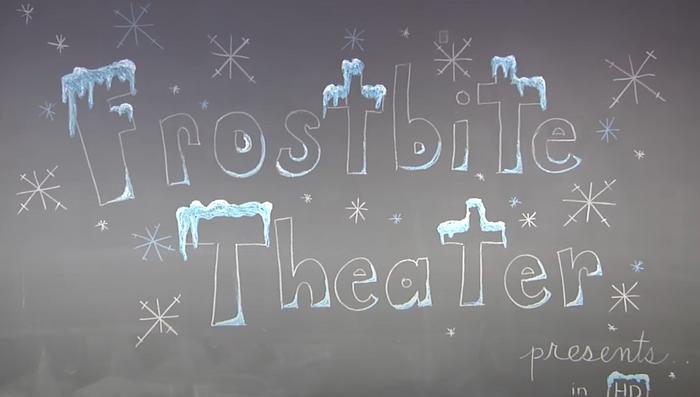NEWPORT NEWS, VA – Here’s a question for you… Is it possible to learn key science concepts in three minutes or less? The answer: We sure hope so. The U.S. Department of Energy’s Thomas Jefferson National Accelerator Facility is now offering a new playlist called “Here’s a Question” as part of its long-running Frostbite Theater video series. In the “Here’s a Question” videos, longtime Frostbite Theater hosts Steve Gagnon and Joanna Griffin help viewers understand the scientific concepts underlying iron oxidation, magnetism and thermodynamics – and many more!

Credit: DOE’s Jefferson Lab
NEWPORT NEWS, VA – Here’s a question for you… Is it possible to learn key science concepts in three minutes or less? The answer: We sure hope so. The U.S. Department of Energy’s Thomas Jefferson National Accelerator Facility is now offering a new playlist called “Here’s a Question” as part of its long-running Frostbite Theater video series. In the “Here’s a Question” videos, longtime Frostbite Theater hosts Steve Gagnon and Joanna Griffin help viewers understand the scientific concepts underlying iron oxidation, magnetism and thermodynamics – and many more!
The series is the newest featured playlist on the Jefferson Lab YouTube channel. In “Here’s a Question,” Jefferson Lab staff members Gagnon and Griffin test different scenarios that explore topics in physical science. They answer compelling questions, such as: What happens to food coloring in liquid nitrogen? and How would bubbles react to a baking soda volcano? Visual demonstrations accompany a step-by-step breakdown of the scientific concept, putting viewers right in the middle of the action.
Gagnon explains that the intent of the series is to “introduce and illustrate a topic, just to get viewers thinking in a fun and informative kind of way.”
Each video begins with the explanation of a scenario, provided by Gagnon and Griffin, which is followed by a multiple-choice question. The viewer then has eight seconds to make their best guess as to what the answer is before the science demonstration is put into action. The format allows viewers to quiz themselves, their friends or their classmates with these brain teasers on basic scientific concepts before discovering the answer.
“I think they’re just interesting science tidbits. As a human, you have questions, and the series is a playful way to approach questions you come across in day-to-day life,” says Griffin.
The experiments allow viewers to witness physical science concepts in real-time. Just as in Frostbite Theater, Gagnon and Griffin are there to lead viewers through an in-depth explanation of why, what, where and how the change is occurring.
Griffin underscores the value of reproducibility for each experiment.
“As a parent, I like that kids can do these at home with adult supervision. The replicability is what makes them fun. I mean, who doesn’t love to make a volcano in your house just because you can?” she says.
The “Here’s a Question” playlist is free to access on YouTube. The series offers a virtual, self-paced opportunity to investigate everyday science. Each video explores a different scientific concept, providing viewers with the ability to passively learn about science in a fun and engaging way. With more than 40 videos to choose from, there’s plenty to explore!
“If all goes well, there will be 42 ‘Here’s a Question’ videos in total and additional Frostbite Theater videos in the future,” Gagnon says.
Further Reading
YouTube: Here’s a Question
Jefferson Lab’s YouTube Channel
Frostbite Theater
Meet Our People: Joanna Griffin
Science Education Resources
By Skyler Tolzien-Or
-end-
Jefferson Science Associates, LLC, manages and operates the Thomas Jefferson National Accelerator Facility, or Jefferson Lab, for the U.S. Department of Energy’s Office of Science. JSA is a wholly owned subsidiary of the Southeastern Universities Research Association, Inc. (SURA).
DOE’s Office of Science is the single largest supporter of basic research in the physical sciences in the United States and is working to address some of the most pressing challenges of our time. For more information, visit https://energy.gov/science.




